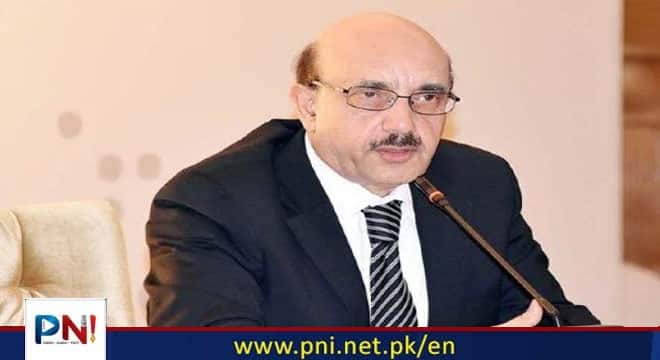Muzaffarabad, May 28: Former AJK President and senior diplomat Sardar Masood Khan has warned that India’s hostile policies pose a serious threat to peace in South Asia and beyond.
In interviews with Radio Pakistan and a private TV channel, Khan said India maintains a war-like posture under Prime Minister Narendra Modi, who has declared that any act of terrorism in India or Kashmir will be blamed on Pakistan and met with retaliation.
“Pakistan must remain fully prepared to respond to any potential escalation, it would be dangerous to harbor any illusions about the intentions of Indian leadership”, he cautioned.
India’s Prime Minister Narendra Modi, Khan said, has publicly stated that any act of terrorism in India or Indian-occupied Kashmir will be attributed to Pakistan and met with retaliatory strikes.
Sardar Masood Khan provided an in-depth analysis of Pakistan-India relations, the prospects for dialogue, and the prevailing Indian narrative. He stressed that recent tensions have sent a clear signal to the international community that any conventional conflict in South Asia holds the potential to spiral into a nuclear confrontation, with consequences extending far beyond the region.
Khan noted that while India persistently accuses Pakistan of sponsoring terrorism, it has never presented credible evidence. Conversely, he asserted that Pakistan possesses irrefutable proof of India’s overt and covert involvement in terrorist activities within its borders-particularly through proxy networks operating in Balochistan and the tribal regions. He reiterated Pakistan’s longstanding commitment to resolving all outstanding disputes, including the Kashmir issue, through dialogue-whether via direct bilateral engagement or third-party mediation.
However, he lamented that India has consistently avoided serious negotiations. On occasions when it has shown a nominal willingness to engage, it has diverted the discourse toward secondary issues, effectively sidestepping the core dispute.
Referring to the Pehalgam incident, Khan accused India of unjustly blaming Pakistan, heightening tensions, and subsequently committing acts of military aggression. He stated that Pakistan responded with a measured and resolute counteraction, effectively thwarting India’s designs.
Following this, he added, New Delhi faced mounting diplomatic pressure that compelled it to express readiness for a ceasefire and talks. Yet, it now appears to be retreating from that stance.
Commenting on India’s proposed “new normal” doctrine, Sardar Masood Khan warned that if India establishes a precedent of blaming Pakistan for every incident and justifying military responses as routine, sustainable peace in the region would become impossible.
He added that if India insists on placing Azad Kashmir and terrorism on the agenda, then Pakistan will equally press for discussions on the future of Jammu and Kashmir and India’s destabilizing activities within Pakistan. Highlighting recent military confrontation, Khan stated that India’s perceived military superiority has been exposed as a myth.
However, he added, Indian leadership remains unwilling to confront this reality. On the subject of U.S. mediation, Khan said Pakistan’s effective military response to Indian aggression prompted international stakeholders, particularly the United States, to intervene diplomatically.
He observed that President Trump expressed satisfaction over the de-escalation and the prevention of war between the two nuclear-armed neighbors. While the U.S. has offered to mediate, India appears reluctant and continues to make excuses to avoid engagement.
He also referenced a recent report accusing India of orchestrating assassinations through agents in Canada, the U.S., and Pakistan—allegations that, according to Khan, reveal India’s expansionist and law-defying tendencies.
Khan expressed deep concern over rising religious intolerance and anti-Muslim policies in India, describing it as the only country where state-sponsored discrimination on the basis of religion is institutionalized.
He pointed out that Muslims in India are routinely labeled as “Pakistanis” and treated as enemies, a mindset that extends to the population of Indian-occupied Kashmir.
Regarding India’s international diplomacy, he remarked that New Delhi’s aggressive and accusatory diplomatic approach is facing growing criticism globally. As a result, India is alienating even its traditional allies. Khan concluded by stating that the West is beginning to recognize the true nature of India’s policies, presenting Pakistan with an opportunity to assert its position more effectively on the world stage.
Follow the PNI Facebook page for the latest news and updates.








